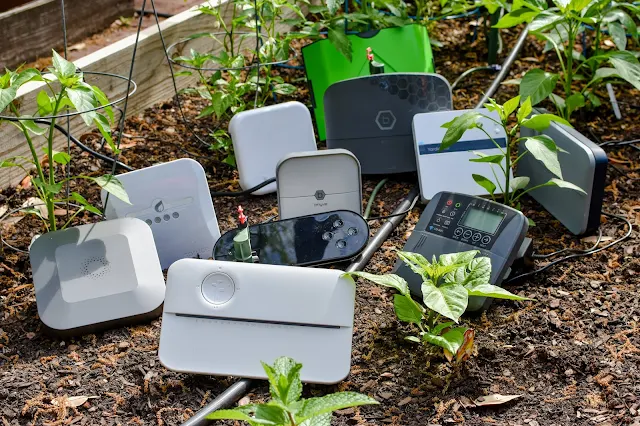Best Smart Sprinkler Controller
Irrigation systems have revolutionized home watering, making it easier and more efficient. The controller, which controls the operation, is the main component of any sprinkler system. Traditionally, controllers have been simple devices with a rotary dial, switches, and a monochrome LCD. However, this is changing with the introduction of smart sprinkler controllers. These come from startups aiming to disrupt the market with new devices and old-guard irrigation companies upgrading their equipment with smart innards. Both approaches have shown some merit. The best sprinkler controllers on the market today include those from startups and old-guard companies.
The best smart sprinkler controllers
Rachio 3 Smart Sprinkler Controller—Best Smart Sprinkler Controller
Pros
- Better water intelligence features improve conservation.
- Revamped wire connectors make setup even faster.
- Onboard controls offer easy access to manual runs.
Cons
- A high-pitched squeal emanates from the device.
- Old Rachio units don’t get access to the same software treatment.
- Expensive
The world’s best smart sprinkler controller gets even better with new features, better wireless connectivity, and smarter water management. (Note: There is also an 8-zone model that sells for less.)
Moen Smart Sprinkler Controller — Best smart sprinkler controller, runner-up
Pros
- Endlessly configurable
- An add-on soil moisture monitor adds utility with no real added complexity.
- Extremely detailed logging in the app
Cons
- No physical controls
- The setup is rocky and archaic.
- Apps can take some time to get used to.
This smart irrigation system has loads of options, especially around soil monitoring, but some will find all that flexibility difficult to wade through. Moen is in the midst of building out a deep and wide smart plumbing ecosystem for the home, and while it’s not quite finished, no other manufacturer has anything comparable.
Wyze Sprinkler Controller: The Best Budget-Priced Smart Sprinkler Controller
Pros
- Cheap, a third the price of most other controllers on the market.
- Easy setup, especially if you just need the basics.
Cons
- Limited to 8 zones
- Weatherproof housing costs extra.
Wyze offers a low-cost, simple sprinkler controller with eight zones for watering plants. Although cheap, the controller has stayed competitive in a narrow market where most solutions cost $150. Installation requires no screwdriver because spring clips connect the oblong device to valve wiring. Wyze prices their items similarly to their other products by delivering simple, affordable options.
Orbit B-hyve XD—the best hose-based smart sprinkler controller
Pros
- Very inexpensive
- Smart functionality greatly eases the headache of scheduling via hardware.
- Reasonably easy to use
Cons
- We encountered headaches getting the Wi-Fi bridge to work properly.
- Smart watering features require the added-cost Wi-Fi bridge.
If you water your landscaping with a garden hose or a simple drip irrigation system, as opposed to an in-ground sprinkler system, Orbit’s second-generation B-hyve XD is vastly superior to conventional non-connected timers, and Orbit’s app can control several of them independently when you add the optional Bluetooth-to-Wi-Fi bridge, which we heartily recommend.
What to consider when buying a smart sprinkler controller
Do you have a sprinkler system already? Some smart irrigation controllers work with garden hoses or other off-the-rack equipment, but most work with genuine irrigation controllers that connect to their own water supply and use motorized valves and dedicated tubing to manage water flow. If you have a large yard or garden, installing a sprinkler system may require professional help, but updating to a smart controller from a “dumb” one is easy. If you are establishing a sprinkler system from scratch, consult a landscaping specialist to layout your zones.
On-device controls: buttons and a readout that allow you to use it without an app—are probably the largest decision you'll make. This is useful if you have numerous users on the system or want to give a gardener access to the controller without setting them up on the app. Systems without on-device controls usually only have a status light to show if it's working, so you'll need the app on your smart phone or tablet to use it.
Indoor/outdoor mounting: If outdoors, the system needs a weatherproof enclosure. Some manufacturers sell indoor and outdoor controllers. Others offer outdoor enclosures separately.
Number of zones: A zone is a regulated area controlled by a valve and its attached irrigation tubing. Four valves equal four zones. A controller with a suitable capacity can support all system zones. Eight zones are typical; however, devices supporting six to 16 zones are available.
Flexible scheduling: You want to water how often? Everyday? Every other day? Certain days of the week? Some controllers can't handle complex schedules, so compare before buying. Some controllers may import zip code-specific legal watering limitations to prevent watering on banned days.
Notifications: Knowing when your watering system is running is helpful, but different products handle the mechanics differently. Many push alerts just tell you when the watering finishes, which is less useful. If you want fancy notifications, select a unit that supports IFTTT. Email and text notifications are rare.
"Smart" scheduling: A smart watering system can optimize water delivery. These don't work properly (they over-water), but rain-skipping solutions are nice. It's not necessary to prioritize "smart" scheduling features.
Support smart-home hubs: Connect your sprinkler system to your smart-home hub. Great idea, however, most smart sprinklers are islands. Though Amazon's Alexa supports some, few connect to anything. Expect this to alter as the goods mature.





